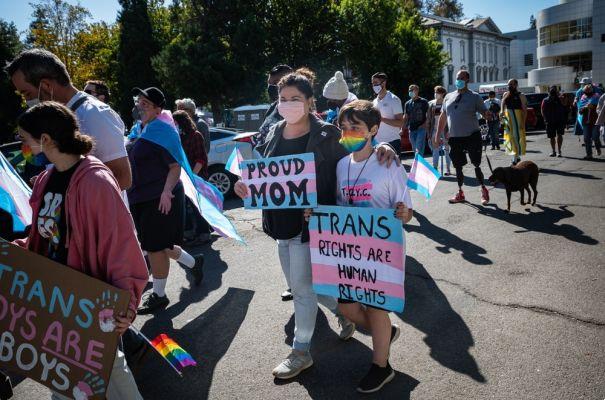On August 7, the Maria da Penha State Law Day is celebrated. The date aims to encourage actions in favor of the defense of women's rights. But calm down: what woman are we talking about?
We know that our society has become increasingly free for people to express the most plural forms of gender identification and sexual orientation. Previously relegated to exclusion, today transgender women have conquered more and more space to assert their rights.
On the other hand, they also became more exposed to crimes hitherto restricted to “biological” women, such as domestic violence against the female population. In these cases, are they also protected by law? That's what we're going to understand in this article.
After all, who is the trans woman?
Before diving into the legislative universe, we need to know who we are talking about. And for that, it is essential to differentiate the concepts of sex and gender, which often generate confusion.
Sex is determined by the genitalia the individual is born with. Thus, if he is born with a penis, he is considered male. If he is born with a vagina, he is considered female.
Gender is the way in which he behaves, dresses and identifies himself. It has to do with social conventions and the roles assigned to men and women in our society. When sex matches gender, the individual is called cisgender. When not, he is called transgender.
A transsexual woman, therefore, is one who was born with the male reproductive system, but identifies with the female gender in the way she gestures, speaks and behaves. Contrary to what many think, to be accepted as transgender, she does not need to undergo any type of surgical procedure, just identify herself as such.
Still, due to prejudice and ignorance, trans women are in an extremely vulnerable position in España. Our country is the one that kills transsexuals the most, accounting alone for 38,2% of homicides in the world.
Indoors is the most dangerous place for them. Between 2014 and 2017, for example, 49% of the aggressions against this group took place in their own homes, according to data from the Information System for Notifiable Diseases (Sinan).
No wonder, the discussion on how to protect these women inside (and outside) the home environment is more alive than ever. Read on to understand how the Maria da Penha Law enters this scenario.
Does the Maria da Penha Law cover transsexuality?
The Maria da Penha Law is a well-known norm because of Maria da Penha herself, the victim of two assassination attempts by her husband, one of which left her a paraplegic. She fought for so long to get the aggressor's conviction in court that legislation was created in her name, with the aim of protecting women from domestic violence (physical or psychological).
In practice, aggressors can be caught red-handed or sent to pretrial detention, without the right to alternative sentences. They can also be kicked out of the house and prohibited from approaching the victim.
As we saw in the last topic, reports like these are not uncommon among transgender women. Until 2022, however, they still could not fully count on the protection of the Maria da Penha Law. This is because, in the text of the law, there is no explicit mention of trans women, pushing the decision to the members of the judiciary.

On the other hand, Article 5 says:
“For the purposes of this Law, any action or omission based on gender that causes death, injury, physical, sexual or psychological suffering and moral or property damage constitutes domestic and family violence against women: (See Complementary Law No. )”.
Note that any action based on gender is considered domestic violence against women. In the genre! Not in sex. In other words: the law must welcome all people who identify themselves as women, whether or not they were born female.
This was exactly the Public Ministry's argument in the recent case of a trans woman assaulted by her father inside the family's home. After the first instance court and the São Paulo Court of Justice (TJSP) denied the protective measures, the Sixth Class of the Superior Court of Justice (STJ) decided that the Maria da Penha Law does apply to her and other transgender women.
According to the ministers, violence against women has its origins in gender violence: it is born from the false idea of male superiority, who believes that women owe him subordination.
Therefore, the Maria da Penha Law does not have to do with the motivations of the attacker, but with the fact that the victim is a woman and that the action takes place in a domestic environment or due to the intimacy of those involved. And that is exactly what happened in this case.
Fortunately, this discussion has been going on for a long time. In the National Congress, for example, there are projects that propose amending the law to include, by name, transgender women in measures to punish, prevent and eradicate domestic violence. Are they:
PLS 191/2017: aims to “ensure women with opportunities and facilities to live without violence, regardless of their gender identity”;
PL 8032/2014: extends the “protection provided for in Law 11.340 to transsexual and transgender people”.
You might also like:
- Learn what characterizes domestic violence
- Understand the difference between cis, trans and transvestites
- Raise awareness about National Transvestite and Transgender Visibility Day
But with the projects still in the pipeline, trans women still depend on the courts to get the protection they are entitled to.
As a society, we cannot be silent in the face of situations like these. If you know of any case of domestic violence in your neighborhood, whether against a cisgender or transgender woman, report it to the Women's Assistance Center. Call 180.

























